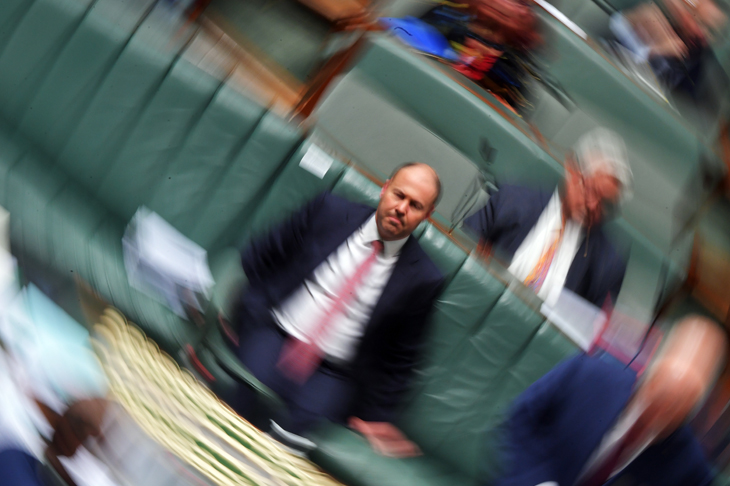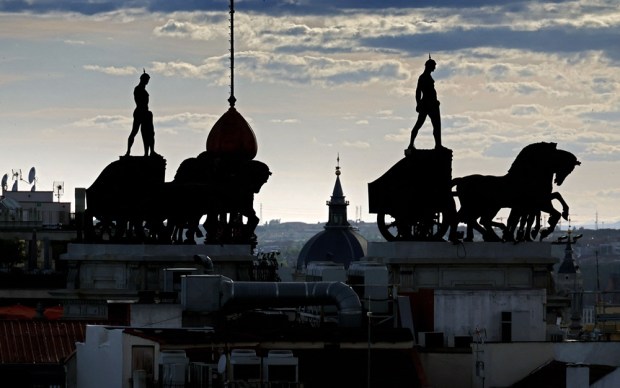At The Spectator Australia, we go behind the news to tell you the truth, no matter how unpalatable it may be. Here, then, is the ugly but true story of the pandemic that has swept through Australia, leaving a trail of devastation in its wake. And it was not Covid-19, but something far worse.
Opinions differed as to where the virus that gave rise to this debilitating pandemic originated. Two schools of thought quickly became the main contenders. The first was that it had escaped from one of a series of think-tanks that were supposed to be promoting market forces. Most of them, however, had become so wet that they were virtually indistinguishable from similar bodies that promoted socialism. Thus, they became known as wet markets, where the wets and their ideology prospered and grew. One such wet market had apparently taken to promoting pink batts because of their earlier association with an expensive but failed government scheme and the foolish politicians who had promoted it. Thus, it was thought by some scholars that the pink batt must have mutated and spread its wings to the human race. Moreover, the first known human being who had become infected with the virus had courageously stood firm in defence of free enterprise, small government and personal freedom for only five minutes until he, too, succumbed to the wet allure of popularity that comes from spending other peoples’ money.
The second candidate centred around a laboratory in the basement of the Treasury building in Canberra run by a mad economist who had been sent there when he started to promote weird and untenable theories like thrift, self-reliance, small government and free enterprise, which were entirely unsuited to the practice of modern economics. To show how crazy he was, and mental health was fashionable at the time, he actually believed that if a government gave people money they did not need or deserve, they would always ask for more, and that if it paid them not to work, they never would. For a while, it looked as if he would have to be put down, but eventually a job was found for him as federal Treasurer, provided that he undertook to abandon his bizarre and archaic views and start to promote responsible and established policies like profligate spending, being a parasite, bludging on the government, borrowing trillions of dollars that could never be repaid, and an array of deserving initiatives to create jobs for the unemployed which were very effective, albeit only for as long as the government kept paying their wages.
But, whatever its origins, once the virus leaked out there was no stopping it. Within a few months it had seized the country by the throat and started to affect the populace in the most alarming ways.
Victims of the virus exhibited three symptoms. The first was an insatiable desire to be paid money by the government. When opinion surveys asked people if they thought they were entitled to government money in a crisis, most of them said ‘yes’. When asked if they would like some of it, they all said ‘yes’. When asked how much, they replied ‘a lot’. When asked if they should receive it only if they needed it, they universally said ‘no’. And when asked if they would pay it back when the virus had been suppressed, again they all said ‘no’. Thus it can be seen that the virus created an unshakeable commitment to getting money from the government.
The second symptom was a marked reluctance in people to stand on their own feet and a corresponding enthusiasm for the government to solve all their problems. This tendency was particularly noticeable among businessmen who had always called for government to get off their backs, advocated free enterprise and personal initiative and those who had been most eloquent in advancing the cause of low taxation. But once this pernicious virus had got hold of them and worked its evil, they rose like one man and demanded that the government should show ‘vision’ and ‘leadership’, give them help and support, prop them up and, when the government eventually gave them something, cried that it was too little too late.
The third symptom was the most alarming. People developed a bizarre lust for being locked up, locked down and prevented from travelling, dancing, kissing, working, shopping, attending weddings, funerals or birthdays, running their businesses and engaging in normal life. And they did it so willingly. As soon as the government announced there would be yet another lockdown or that people could not visit their dying grandparents or go to a party, they cried, ‘Lock us up. We’re all in this together’. And those who had talked most about liberty were the first to surrender it. It was as if they had drunk the Kool-Aid, or contracted Stockholm syndrome, or both. And no one who had been so penalised asked why they had to suffer these restrictions or what proof there was that they worked. Fortunately, the rules did not apply to those in essential services like celebrities, influencers, elite sportspeople, foreign film producers, people with yachts and politicians (until caught kissing).
The virus even reached into the highest orders of society. Political leaders revelled in being able to lock up their servile and indoctrinated constituents, destroy their businesses and punish them for breaches of the volumes of new laws introduced for the occasion, as it showed how tough and uncompromising they were. And it got a grip on the brains of hitherto responsible members of parliament who took to calling themselves modern Liberals and inventing new ways of spending money.
Some even claimed the virus was God’s punishment for not making same-sex marriage compulsory.
Got something to add? Join the discussion and comment below.
Get 10 issues for just $10
Subscribe to The Spectator Australia today for the next 10 magazine issues, plus full online access, for just $10.
You might disagree with half of it, but you’ll enjoy reading all of it. Try your first month for free, then just $2 a week for the remainder of your first year.















Comments
Don't miss out
Join the conversation with other Spectator Australia readers. Subscribe to leave a comment.
SUBSCRIBEAlready a subscriber? Log in